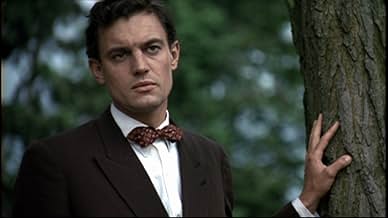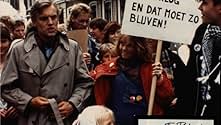IMDb RATING
7.2/10
3.5K
YOUR RATING
A Dutch doctor, haunted by grueling childhood memories of World War II, struggles to find peace as he spends his life looking for answers about the tragic night that shaped him.A Dutch doctor, haunted by grueling childhood memories of World War II, struggles to find peace as he spends his life looking for answers about the tragic night that shaped him.A Dutch doctor, haunted by grueling childhood memories of World War II, struggles to find peace as he spends his life looking for answers about the tragic night that shaped him.
- Director
- Writers
- Stars
- Won 1 Oscar
- 5 wins total
John Kraaijkamp Sr.
- Cor Takes
- (as John Kraaykamp)
Akkemay Elderenbos
- Sandra
- (as Akkemay)
- Director
- Writers
- All cast & crew
- Production, box office & more at IMDbPro
Featured reviews
In the long run non-violence eventually overcomes violence. It is extremely difficult not to become an extremist. Being the center of the wheel requires great patience and understanding, as one is always tempted to take shortcuts in life via violence. A senseless, ill-planned act of sabotage in the Netherlands gets an entire innocent family killed. This is a prime example of how violence eventually falls down upon itself.
This film deservedly won the best foreign film of the year for 1986. The performances are first-rate, especially that of the child actor and the adult actor of the main character. This film is both a mystery and a tragedy at the same time; not an easy combination to put together for a director. The direction is impeccable. The screenplay is beautifully written, and in the final analysis, all of the events that take place after WW 2 just do not have the same significance and power as that horrible event. Truly a film classic.
This film deservedly won the best foreign film of the year for 1986. The performances are first-rate, especially that of the child actor and the adult actor of the main character. This film is both a mystery and a tragedy at the same time; not an easy combination to put together for a director. The direction is impeccable. The screenplay is beautifully written, and in the final analysis, all of the events that take place after WW 2 just do not have the same significance and power as that horrible event. Truly a film classic.
This film is based on the Harry Mulisch novel, and both have some distinguishing characteristics that go back - on purpose - to classic Greek tragedy theatre. The incredible co-incidence that carries the story is reminiscent of ancient literary 'vehicles' that carry a story. Thus, you should not look at the chance events as being part of the story, but as being the foundation for the story - they, in themselves, should not really be questioned.
Also, note that every chance meeting is preceded by a meeting with some kind of stone. The Dutch word for dice is 'dobbelsteen', or dicing-stone, so that the simile of dice and chance can be extended to stones and chance. This explains the significance of Anton meeting his first wife while visiting the Stone of Scones.
The book, more strongly than the film, is also constructed as a Greek tragedy, with a prologue, five acts and then an epilogue.
Anton Steenwijk is also interesting himself: he represses the events of the assault, but it keeps coming back at him. But he is an anaesthetist in more than one way - he puts his memories to sleep. Even in the final stages, when the story is already quite clear to him, he uses drugs at his house in Tuscany and seeks to ease a toothache in Amsterdam before going to the Ban the Bomb demonstration.
Personally, I think the book was translated into a film in brilliant fashion. My major qualm with it is the mediocrity of the sound and sound effects. Some pretty good acting and a fantastic storyline make this one well worth the watch.
Also, note that every chance meeting is preceded by a meeting with some kind of stone. The Dutch word for dice is 'dobbelsteen', or dicing-stone, so that the simile of dice and chance can be extended to stones and chance. This explains the significance of Anton meeting his first wife while visiting the Stone of Scones.
The book, more strongly than the film, is also constructed as a Greek tragedy, with a prologue, five acts and then an epilogue.
Anton Steenwijk is also interesting himself: he represses the events of the assault, but it keeps coming back at him. But he is an anaesthetist in more than one way - he puts his memories to sleep. Even in the final stages, when the story is already quite clear to him, he uses drugs at his house in Tuscany and seeks to ease a toothache in Amsterdam before going to the Ban the Bomb demonstration.
Personally, I think the book was translated into a film in brilliant fashion. My major qualm with it is the mediocrity of the sound and sound effects. Some pretty good acting and a fantastic storyline make this one well worth the watch.
I have seen this movies so many times that the subtitling has become irrelevant. Smarty movie with worldwide appeal. A growing up MD is subconciously living a life that has been dramatically changed by an incident during the WWII. such powerful characters. I walk out the movuie stunned at the way the movie works for me. go and see it for yourself
The film and the book, are really very much the same here. I read the book first and then watched the film and I have really not much to say about both. They are both of the same quality, for both book and film feature the same amount of accidental meetings which are after a while quite unbelievable and that is all the criticism I have. The film has of course certain things which are better than the book, for instance it is more exciting, but then again the film also has it's downsides, for sometimes the acting is not that great. But overall the better and worse things level each other out so my verdicts for book and film are the same: pretty good.
If you like Mulisch's books and are interested in World War 2 read De Zaak 40/61.
7 out of 10
If you like Mulisch's books and are interested in World War 2 read De Zaak 40/61.
7 out of 10
In January 1945, during the second world war, the Dutch resistance kills a collaborator in the street where the 12 year old Anton Steenwijk lives. The man was shot in front of his neighbors house, but is moved by them to the house of the family Steenwijk. Because of this, his father, mother and brother are killed by the Germans, and their house is set to fire. During his life, Anton meets several people that tell him more about what really happened on the night of the assault.
What really makes this a great film is how it covers so much of the 20th century, at least the major war events. Vietnam, Stalin, Hungary and more... this is not just a story about the Netherlands in World War II, but really a larger tale of Europe. The balance between the personal and the international is what makes it such a notable film.
What really makes this a great film is how it covers so much of the 20th century, at least the major war events. Vietnam, Stalin, Hungary and more... this is not just a story about the Netherlands in World War II, but really a larger tale of Europe. The balance between the personal and the international is what makes it such a notable film.
Did you know
- GoofsAll entries contain spoilers
- Quotes
Anton Steenwijk: My parents were innocent.
Fake Ploeg: My father was too!
Anton Steenwijk: I only know what I was told.
Fake Ploeg: Exactly.
- ConnectionsFeatured in The 44th Annual Golden Globe Awards (1987)
- How long is The Assault?Powered by Alexa
Details
Box office
- Gross US & Canada
- $512,403
- Gross worldwide
- $512,403
- Runtime2 hours 21 minutes
- Sound mix
- Aspect ratio
- 1.66 : 1
Contribute to this page
Suggest an edit or add missing content












